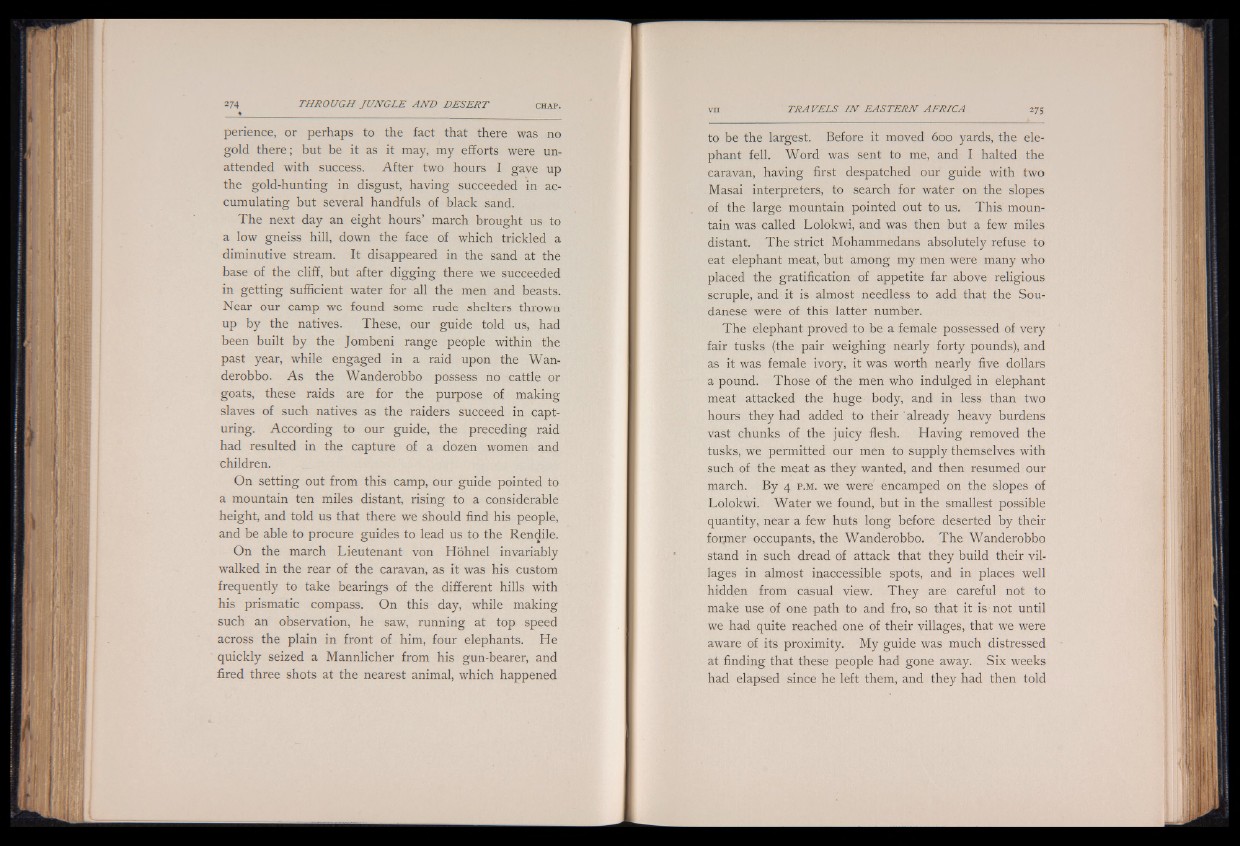
perience, or perhaps to the fact that there was no
gold there; but be it as it may, my efforts were unattended
with success. After two hours I gave up
the gold-hunting in disgust, having succeeded in accumulating
but several handfuls of black sand.
The next day an eight hours’ march brought us to
a low gneiss hill, down the face of which trickled a
diminutive stream. It disappeared in the sand at the
base of the cliff, but after digging there we succeeded
in getting sufficient water for all the men and beasts.
Near our camp we found some rude shelters thrown
up by the natives. These, our guide told us, had
been built by the Jombeni range people within the
past year, while engaged in a raid upon the Wan-
derobbo. As the Wanderobbo possess no cattle or
goats, these raids are for the purpose of making
slaves of such natives as the raiders succeed in capturing.
According to our guide, the preceding raid
had resulted in the capture of a dozen women and
children.
On setting out from this camp, our guide pointed to
a mountain ten miles distant, rising to a considerable
height, and told us that there we should find his people,
and be able to procure guides to lead us to the Rendile.
On the march Lieutenant von Hohnel invariably
walked in the rear of the caravan, as it was his custom
frequently to take bearings of the different hills with
his prismatic compass. On this day, while making
such an observation, he saw, running at top speed
across the plain in front of him, four elephants. He
quickly seized a Mannlicher from his gun-bearer, and
fired three shots at the nearest animal, which happened
to be the largest. Before it moved 600 yards, the elephant
fell. Word was sent to me, and I halted the
caravan, having first despatched our guide with two
Masai interpreters, to search for water on the slopes
of the large mountain pointed out to us. This mountain
was called Lolokwi, and was then but a few miles
distant. The strict Mohammedans absolutely refuse to
eat elephant meat, but among my men were many who
placed the gratification of appetite far above religious
scruple, and it is almost needless to add that the Soudanese
were of this latter number.
The elephant proved to be a female possessed of very
fair tusks (the pair weighing nearly forty pounds), and
as it was female ivory, it was worth nearly five dollars
a pound. Those of the men who indulged in elephant
meat attacked the huge body, and in less than two
hours they had added to their already heavy burdens
vast chunks of the juicy flesh. Having removed the
tusks, we permitted our men to supply themselves with
such of the meat as they wanted, and then resumed our
march. By 4 p .m . we were encamped on the slopes of
Lolokwi. Water we found, but in the smallest possible
quantity, near a few huts long before deserted by their
foijner occupants, the Wanderobbo. The Wanderobbo
stand in such dread of attack that they build their villages
in almost inaccessible spots, and in places well
hidden from casual view. They are careful not to
make use of one path to and fro, so that it is not until
we had quite reached one of their villages, that we were
aware of its proximity. My guide was much distressed
at finding that these people had gone away. Six weeks
had elapsed since he left them, and they had then told